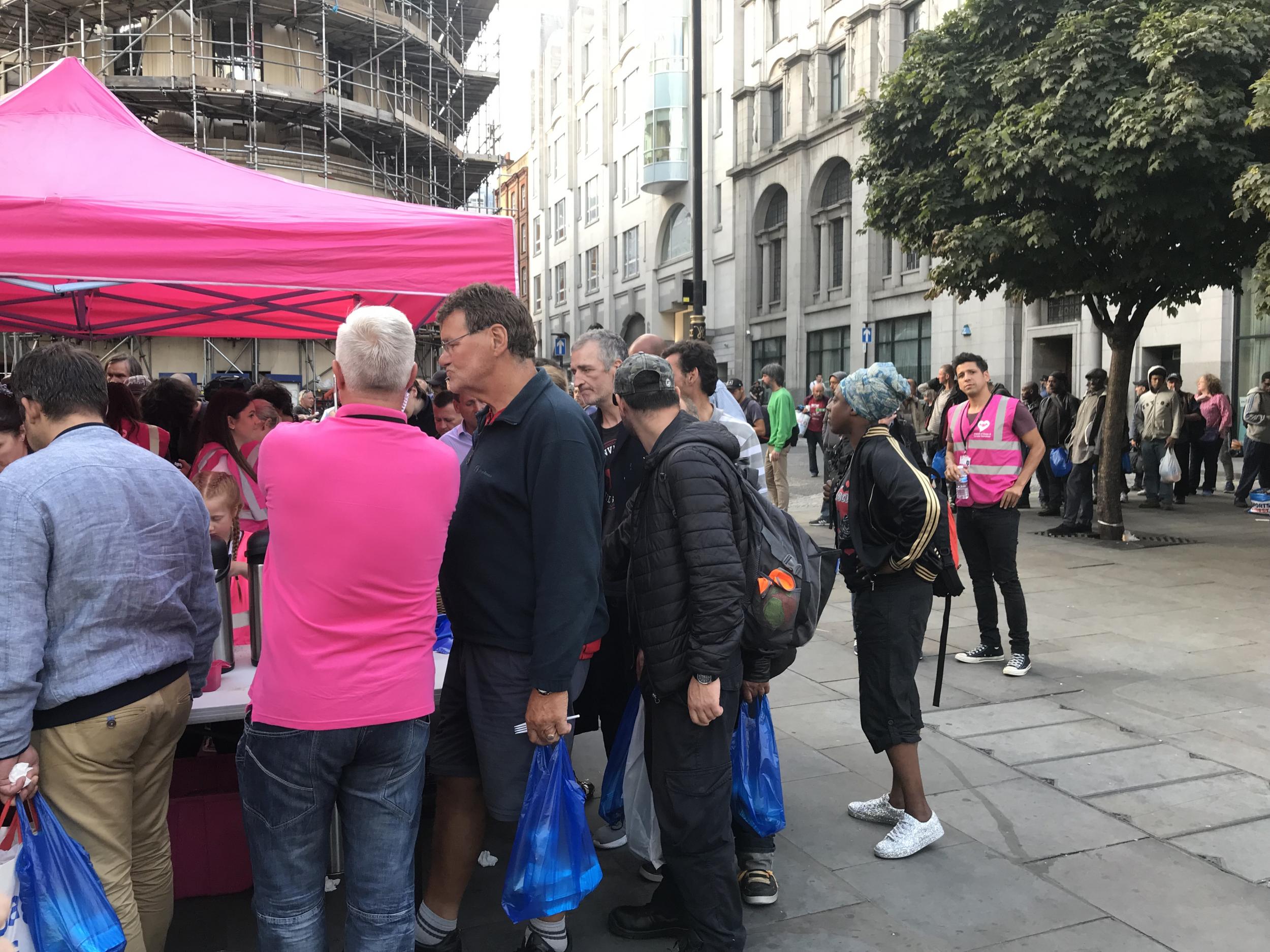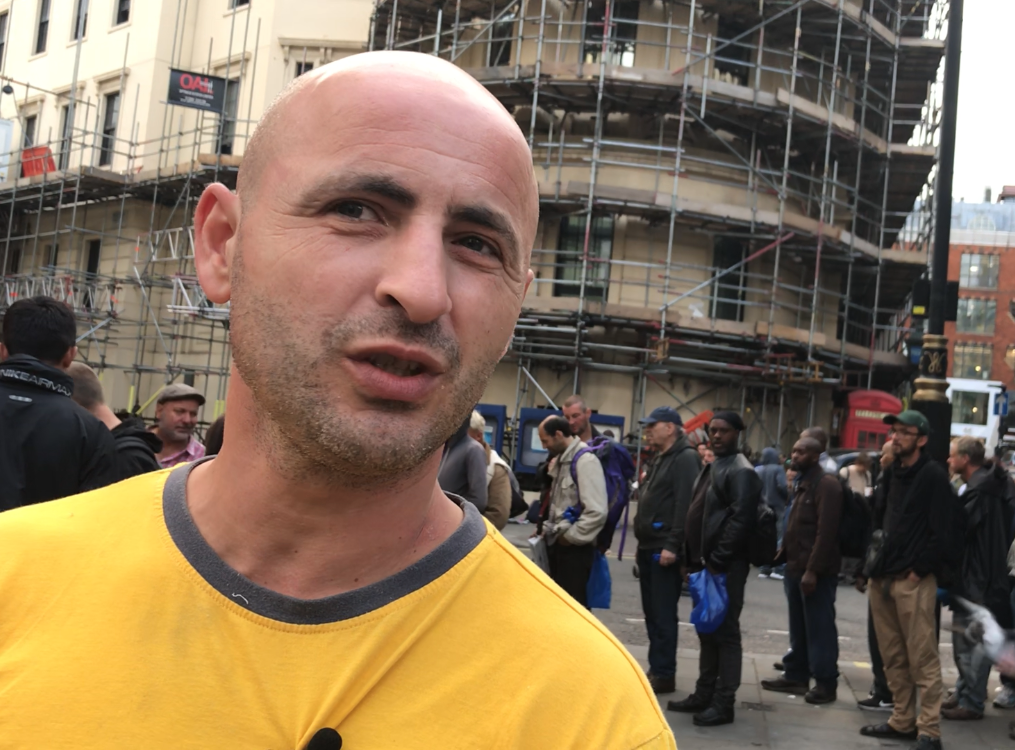London workers are queuing up for free food because they can't afford to eat
Growing number of people forced to choose between rent and food as cost of living continues to soar
Your support helps us to tell the story
From reproductive rights to climate change to Big Tech, The Independent is on the ground when the story is developing. Whether it's investigating the financials of Elon Musk's pro-Trump PAC or producing our latest documentary, 'The A Word', which shines a light on the American women fighting for reproductive rights, we know how important it is to parse out the facts from the messaging.
At such a critical moment in US history, we need reporters on the ground. Your donation allows us to keep sending journalists to speak to both sides of the story.
The Independent is trusted by Americans across the entire political spectrum. And unlike many other quality news outlets, we choose not to lock Americans out of our reporting and analysis with paywalls. We believe quality journalism should be available to everyone, paid for by those who can afford it.
Your support makes all the difference.During rush hour on one of London’s most affluent streets, amid the bustle of the Strand, an orderly queue is forming. Dozens of people stand patiently, and hungrily, waiting for their dinner.
The gathering, near Charing Cross station, comprises people of all ages and ethnicities. Some look visibly homeless, clutching large carrier bags containing their worldly possessions. Others wear work clothes. Despite having a job, they can’t afford to eat.
Piles of food packages await under a pink gazebo. As volunteers hand them out, bread and pastries are scoffed into hungry mouths. Many people eat standing up; others find a picnic spot on the ground; some leave to take food home.
Commuters passing by on the main road peer curiously before rushing on. Well-dressed couples cut through the snaking queue on their way to the theatre. “It’s a disgrace!” shrills one woman wearing a large pearl necklace as she and her husband saunter away.
Toney Kane is a 39-year-old mother-of-three who comes to the handout every week. She explains she has spent five of the past eight years homeless with her children, who are now in their 20s. They came to London from Hull after she found herself trapped in an abusive relationship.
“I didn’t get any help. I asked if I could be moved and they said [they would move] us into a property just a few streets away from him. I just wanted to get out,” she told The Independent. “That’s when I decided to move out of Hull.
“We were supposed to move in with family in Woking, but they left us stuck at King’s Cross station. We had to stay on the streets. When we first came, people used to rob off us. In the winter the snow would just come down on us. Nobody would help.”

Ms Kane and her children were on the streets for nearly three years before they were given a council flat. They were then evicted because she complained, at which point they became homeless again. She is now in another flat, but says she is in the process of being evicted again.
“If you sit down and beg, yeah you do get given food, but it’s not going to be every day,” she says. “That’s why this place is so important.”
Emmanouil Grammatikopoulos, 38, smiles gratefully as he is handed a food parcel. He has been sleeping rough in London for nearly two years, after leaving Greece in the wake of the financial crash. He takes construction jobs and sends money home to his wife and baby daughter. His wife doesn’t know he is homeless.
“I cannot pay to rent in London. It’s very expensive – even one room. If I pay for a room here in London, I cannot pay the rent for my wife and three-year-old daughter at home. I must give the money to them,” he explains.

“I could make only 25 euros a day in Greece after the crash, so I came here. I work all the time, for construction agencies. They pay me so I try to do my best.
“When you sleep in the streets and you have to wake up at 6am to go to your job, it’s a little hard. When you finish you don’t have a place to have a shower. You don’t rest properly to be ready for the next day. But I can do it for now. I’m grateful for that because I have work.”
Walking away from the gazebo, another EU national, who didn’t want to give his name, grips a paper cup of steaming tea with a plastic bag of newly retrieved food hanging from his wrist. He looks smart in a sky blue shirt, navy trousers and black shoes, and laughs when asked if he is homeless.
“No, I have a room, but I share with three other people,” he says, explaining his bedroom is where three other men sleep. He pays £60 per week for rent. “Yes, I work. But this is what I can afford.”
Richard, 62, is smartly dressed in a white shirt that matches the colour of his bristly beard. He is well spoken and well-versed in the political rhetoric on homelessness. You wouldn’t expect him to be rough sleeping.
A pensioner who used to work in the operating department of a hospital, he is living off his NHS pension of just £350 a month. When his mother died two years ago, his life fell apart and he got evicted from his flat.
“I’ve been homeless for a year. It’s not easy, especially when the weather gets bad,” he says. ”Washing and showering can be really difficult. But how can I ever get a deposit? The rents are so expensive. The landlords can charge what they want.”
Chatting jovially to people as they wait in the queue is Steven Stuart, founder of the Friends of Essex and London Homeless charity, which provides the food handouts in the same spot every Wednesday evening.
“When we first started we had about 30 or 40 people each time, now we have anywhere between 150 and 250. It’s an opportunity for people to get some food, so that they can still pay that bill to have somewhere to live,” he says.
“We find that people are not homeless as we know it. A lot of people are homeless and working. We get Deliveroo drivers quite a lot. There’s a road sweeper who picks up the rubbish who comes along sometimes. He’s not homeless, but I wouldn’t imagine he’s earning a great amount of money.
“A lot of people [are] no different to you and I. Rents outstrip wages by so much these days and people are losing their jobs all the time. Some people have just taken a left turn and need a bit of help.”

Join our commenting forum
Join thought-provoking conversations, follow other Independent readers and see their replies
Comments